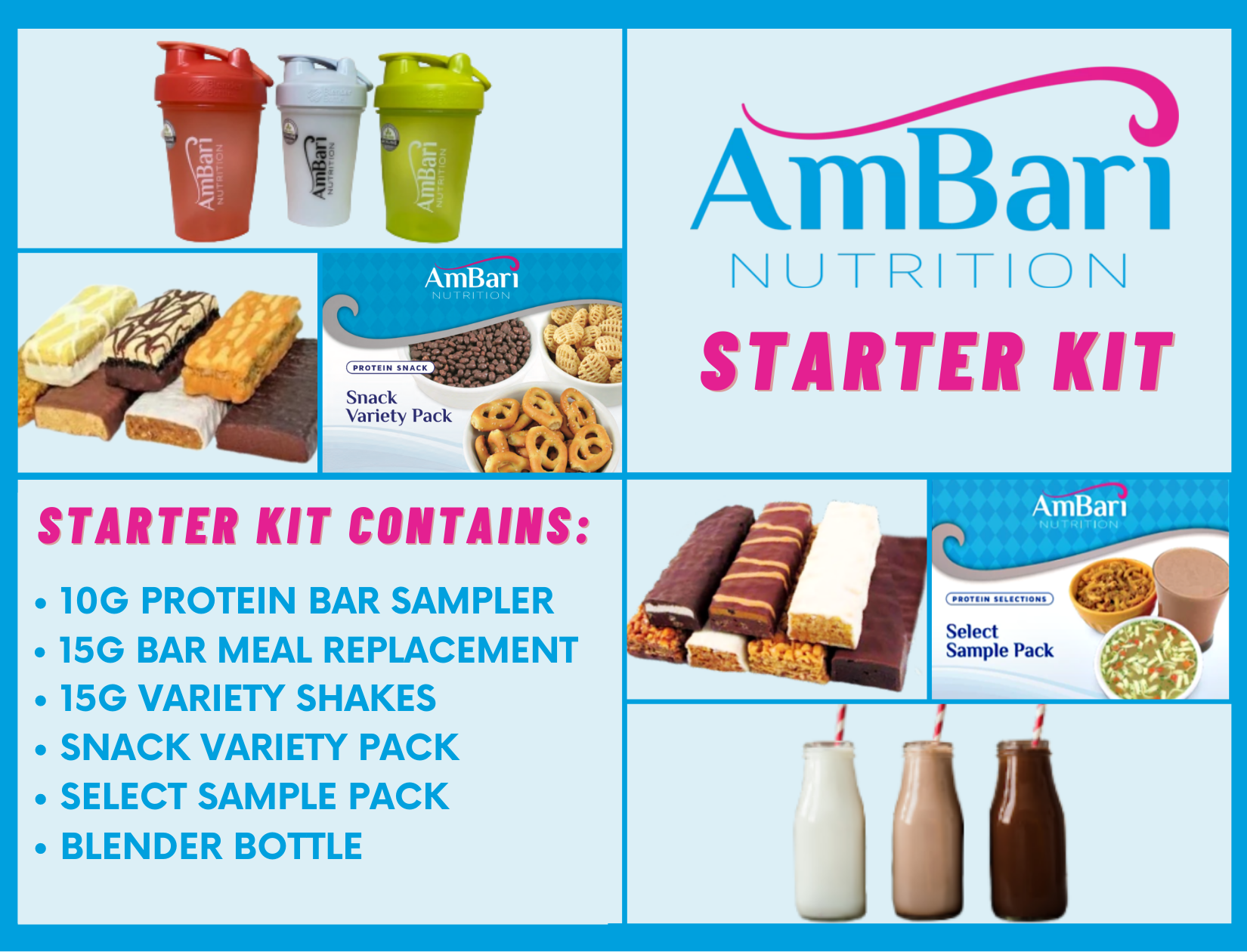Menu
Your cart is empty
Looks like you haven't added anything to your cart yet

Celiac Disease and a Bariatric Diet - Why Supplements are Essential
Understanding Celiac Disease: A Personal Journey
Celiac disease, or gluten intolerance, is now a well-known health issue. It even has its own website!! As a child in the 1980’s I was fortunate enough to have a Mother who took the time to read. She noticed that a researcher in the US had noted that some kids seemed to be sensitive to wheat and showed an improvement in BMI (either low or high) and cognitive performance when placed on a gluten-free diet. I was a problem child and she helped me learn I was celiac.
The Challenges of Gluten-Free Living in the 1980s
It was in no way easy, or fashionable to be gluten-free in the 1980s. It was a pain in the neck. This forced me to learn how to use diet to control my health and BMI. With my mom's constant assistance, I was able to develop as a healthy child and get my BMI under control.
Celiac disease causes malabsorption of food – this can cause both low and high BMI! Increasingly, researchers find that celiac is associated with high BMI issues. In these cases, bariatric surgery may be necessary. Luckily, there are few negative consequences, and the surgery is effective in improving the quality of life in most patients according to the above paper.

The Critical Nature of a Gluten-Free Diet for Celiacs
What should we know about Celiac disease and how does this affect a bariatric diet? Untreated celiac is what happens when any person does not stick to a true gluten-free diet. Gluten is to a celiac like HIV is to Aids. You cannot have a little bit of HIV or a little bit of Gluten. Both affect the immune system, so eventually, a little bit will have a big effect!
With celiac, you just cannot cheat. Many people find this difficult, and the result is that their intestines remain damaged by celiac symptoms – this means that the absorptive surface of the intestines is reduced by swelling and in some cases scarring. If you are a naughty celiac, and sneak little gluten meals, or take chances, then you must be even more careful about taking supplements – your intestines are just unable to absorb what you need from an un-supplemented diet.
Vitamin Deficiencies in Celiac Disease Combined with Bariatric Surgery
In cases of Celiac, both where high BMI and low BMI are encountered, vitamin deficiencies are very common.
The above paper lists, in order of severity:
Zinc
67% of recently diagnosed celiac patients showed a major zinc deficiency. Zinc is needed for more than 300 enzymes in the body (when I was a student it was “more than 200”). I am sure the list will increase with time.
From enzymes that help to translate your DNA into proteins, to enzymes that give you energy, fertility, healthy immunity, healthy circulation, and many more, without enough zinc you are not going to function properly.
If we watch a chimpanzee or gorilla eating, it eats leaves all day – these leaves have a constant supply of zinc in them. This means that there is no need for these sorts of animals to store zinc – we are in the same family, but we don’t browse leaves as much anymore – so consuming regular small doses of zinc throughout the day helps to simulate this browsing.
Drinking a shake like this, between meals provides 25% of your daily zinc requirement with each cup. Much like a leaf, this drink also contains fiber that will nourish your beneficial gut microbes. If you consume zinc once a day with a multivitamin, within a few hours of taking it, the zinc has all left your body after a few trips to empty your bladder. This is why regular zinc between meals can help you feel much better. If you want to be a real chimp, eat salad between meals!
Iron
The same study showed that 46% of newly diagnosed celiacs had low iron with 32% having anemia. When managing celiac and a post-surgery bariatric celiac diet it is important to take iron supplements. This specific product contains ferronyl carbonyl iron which has been shown, since the 1980’s, to be effective and safe in treating anemia. Iron supplementation should be discussed with your doctor and dietician, and I would recommend regular blood samples be taken to monitor this – too little or too much iron are both very bad things.
Vitamin B group
The vitamin B group, all of which are important for keeping you feeling good and healthy tend to be deficient in our bodies as celiacs. If you are a celiac patient who has had bariatric surgery, monitoring vitamin B levels, and supplementing your diet with a specially formulated multivitamin with a balanced high dose of vitamins in the B group is crucial. You will note that this multivitamin also contains iron and zinc, helping with the above problems. Typically, a multivitamin is taken with a meal, as food aids in the absorption of certain of these vitamins.
Vitamin A
A small percentage of the celiac patients analyzed showed a vitamin A deficiency. A daily bariatric multivitamin formulated to supply what a post-operative bariatric patient requires should be more than enough to correct this problem. Vitamin A is a bit of a scary vitamin, and you can kill yourself with it. Always consult a doctor and dietician before taking big supplements of this vitamin and do so with regular blood tests.
Conclusion: Managing Celiac Disease and Post-Bariatric Surgery Needs
Celiac is a serious condition, which, combined with bariatric surgery creates a unique set of requirements for vitamin supplements and diet considerations. ~ Dr. Garth Cambray
- Work with your doctor and dietician
- Take supplements and regular blood samples to monitor levels of vitamins, specifically those mentioned in this paper.
Some doctors are skeptical about Celiac disease – in this case, providing them with the paper, and asking for advice in this regard helps to create an incentive for them to listen to you. Remember doctors sell life-changing solutions in 15-minute time slots – these time slots are often a bit shorter than what is required to understand an individual patient's absolute requirements.
Arming yourself with knowledge and background reading from published peer-reviewed data helps you to get the best attention you can. Popular press articles (such as this one I am writing) are just opinions and irritate doctors. Published peer-reviewed papers are closer to facts. They can still be flawed, but, if they are, people will find out and eventually expose the flaws.
Providing, by e-mail, proof that a query you have is based on some form of scientific evidence, ensures that the advice you receive will also be based on a reasoned response. We want to always move medical practitioners into the space of making logical - not gut feel - diagnoses and treatments. This ensures the best outcomes for both the patient and practitioner.
Writer: Dr. G. Cambray Dr. Cambray has a PhD in applied microbiology and works in several fields including research into products that enhance the human microbiome. He is a beekeeper, gardener, and mushroom cultivator who believes you are what you eat. In this regard, you must pay special attention to the quality of the food and supplements you consume to ensure you can be the best version of yourself. |
Reviewed By: Dr. K. Huffman Dr. Kevin D. Huffman, D.O., is a board-certified bariatric physician renowned for his expertise in treating obesity. With over 10,000 patients and a reputation as a national leader in bariatric medicine, he has trained hundreds of healthcare providers. Dr. Huffman develops protocols and training materials for medical societies, pharmaceutical companies, patients, and hospitals. |
- Choosing a selection results in a full page refresh.




































